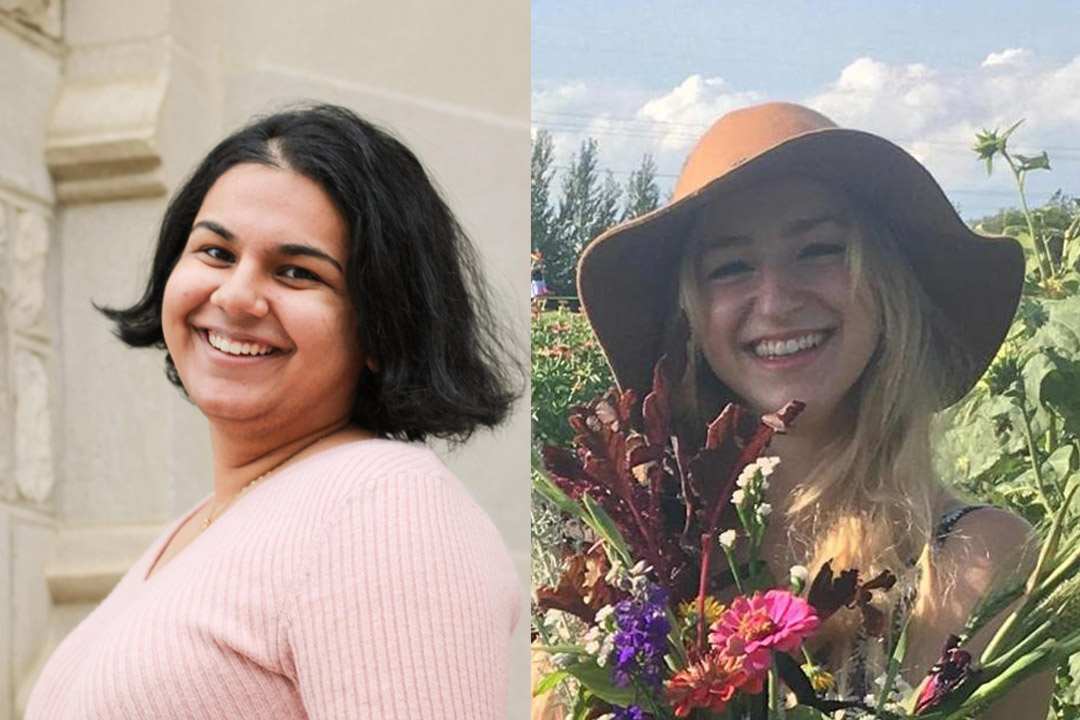
First USask students announced as McCall MacBain Scholarship finalists
University of Saskatchewan (USask) students Nikaela Lange and Vaidehee Lanke are in the running for the McCall MacBain Scholarships, Canada’s first comprehensive leadership-based scholarship program for master’s and professional studies.
By University CommunicationsThe scholarship enables students to pursue a fully funded graduate degree at McGill University while participating in an intensive leadership development program. McCall MacBain Scholars are matched with mentors, advisors and coaches who accompany them on their journey.
“The success of these students in the McCall MacBain Scholarships is a wonderful achievement for these individuals and an example of the impact that a USask education can have,” said Dr. Nancy Turner (PhD), director of Teaching and Learning Enhancement at USask. “We are committed to see our students graduate as leaders the world needs, and our academic programs, instructional approaches and rich co-curricular opportunities support students to develop competencies and contribute to society as ethical community members.”
Lange and Lanke will be among 50 Canadian finalists representing 28 universities at a final round of interviews from March 24 to 26. They are the first finalists to be selected from USask. During the interviews, they will meet with leaders from academia, business, government and the social sector. Final interviews are planned to take place in Montréal.
Nearly 700 people applied for the McCall MacBain Scholarships this year and 146 participated in regional interviews with local leaders in November before the 50 finalists were selected. Up to 20 McCall MacBain Scholars will be chosen after final interviews.
Finalists were chosen based on their character, community engagement, leadership potential, entrepreneurial spirit, academic strength and intellectual curiosity. They include aspiring dentists, engineers, entrepreneurs, community leaders, scientists, lawyers, policy-makers, doctors and public health specialists.
Lange, who earned a Bachelor of Arts at USask in 2021, contributed to the political studies student association for four years and worked part-time as a research assistant in the political studies department at USask throughout her studies. She co-founded a community fridge, which provides 24/7 access to free nutritious food and helps oversee its daily operations, including volunteer management and donations. Lange also volunteers with Food Not Bombs Saskatoon, packing and delivering food hampers in the community.
Lange currently works as the youth program co-ordinator at the Saskatchewan Prevention Institute. She is applying to start a Master of Arts in political science at McGill, hoping to continue her research on the use of open-source intelligence in global pandemic preparedness and response.
“I had the good fortune to have really supportive and encouraging professors at the University of Saskatchewan,” said Lange. “They helped me find volunteer and professional opportunities, hired me onto research projects and teaching assistantships, and supported my goals and projects during and beyond my undergraduate degree. It is only because of them that I have this opportunity.”
“I strongly believe in mutual aid,” she added. “It’s about taking responsibility for caring for one another in whatever ways we are able to, giving what we can and taking what we need. This is how we create relationships with one another and build stronger communities where all of us have the chance to thrive and achieve our dreams.”
Lanke is completing a bioinformatics degree at USask as a Schulich Leader and plans to graduate later this year. She works part-time as the opinions editor of the Sheaf, the university’s student-led newspaper, where she recruits student writers, mentors them and collaborates with other editors. She also started a student club focusing on science, research and society, and helped create a student voice booklet on affirming gender diversity for the Canadian Teachers’ Federation.
Lanke has spent the past two summers working as a student researcher, evaluating deep learning models to predict anti-microbial resistance phenotypes. She hopes to pursue a Master of Science in epidemiology or public health at McGill.
“From the initial written application to regional interviews, I’ve had a wonderful experience with the McCall MacBain Scholarships,” said Lanke. “The process encourages you to reflect on your life journey, aspirations and ideas to make the world a better a place, all while meeting amazing students. I am incredibly honoured to be a finalist, and I look forward to sharing more of my life story and learning from all the other finalists at the final interviews.”
Natasha Sawh, dean of the McCall MacBain Scholarships, said the finalists have demonstrated empathy, integrity, and courage in a rapidly changing world.
“While their undergraduate experiences may have differed from what they initially expected, these students have dedicated their time and talents to a wide array of initiatives,” said Sawh. “They have distinguished themselves through their commitment to meaningful social change.”
The McCall MacBain Scholarship covers tuition and fees for the program of study, a living stipend of $2,000 per month, mentorship, coaching and leadership development opportunities.
The 20 McCall MacBain Scholars will be announced in early April. Finalists who are not selected as McCall MacBain Scholars will be eligible for a $10,000 finalist award for their studies at McGill.
The scholarships are the result of a $200 million gift, which at the time was the largest single donation in Canadian history, by John and Marcy McCall MacBain. The scholarship program will expand internationally over the next decade, with nearly 300 McCall MacBain Scholars selected by 2030.
The next deadline for USask students to apply for the McCall MacBain Scholarship is Sept. 21, 2022.

